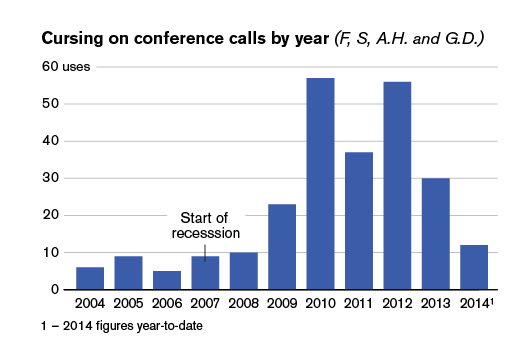Cursed Turns
Sometime in 2007, the U.S. and global economies took a turn for the worse. Called “the Great Recession” by some, the period began a downturn which in many respects we have not yet recovered from and may never fully. As is often the case, those hit hardest by the evaporation of jobs and plummeting home values are among the lesser-off among us, and it wouldn’t surprise others to hear those such affected to rattle off a swear word or two. Cursing, as previously discussed in these pages, can be an effective stress (and even pain) reducer.
And, apparently, in hard economic times, swearing works for CEOs, too. When the going gets tough, the tough get cursing.
In July of 2014, Bloomberg (the media company, not the former New York City mayor who founded it) investigated the changes in the language of top executives, focusing on public statements made during conference calls with Wall Street analysts and investors. Over a ten-year period, Bloomberg found 254 swears used in this context. Of those 254, 197 — more than 75% — were some variant of a word meaning poop and starting with “sh.” The sacrilegious “GD” term was in second place at 34 uses. There were 17 uses of the F-word, and, rounding it out, six of seven-letter term ending in “-hole.” (Bloomberg unfortunately did not report whether any of the terms were used in conjunction, so it’s unclear whether f’ing a’hole would be considered one swear or two.)
But more interestingly than the word choice? The timing. What Bloomberg realized, as seen in the infographic below (full one here), is that the recession made CEOs much more willing to drop a choice term here and there:

While the absolute number of swears caught were low — even at its peak years in 2010 and 2012, they were uttered on earnings calls a mere 50 or so times — the shape of the curve is clear: in down times, swears go up. That’s probably not an economic indicator you can take to the bank though — the downtick in language appropriateness follows the downtick in the economy, not the other way around. On the other hand, it may help their businesses. Bad words may help leaders lead — in the right context and usage. As the Harvard Business Journal reported in 2010, a study by a university in England found that curse words, used judiciously, can make leaders seem more genuine while rallying the team behind a common issue. Further, there’s the aforementioned benefit of stress release.
That doesn’t make boards or analysts happy, though. While they certainly understand that even CEOs need to blow off some steam, decorum doesn’t really allow for such linguistic behavior. In one particular instance, the CEO of Scotts Miracle-Gro was publicly reprimanded for his wanton use of a bad word (the exact quote wasn’t disclosed, but many believe it was this, again via Bloomberg). And some CEOs take it upon themselves to quickly follow their F-bombs etc. with a quick apology, Bloomberg noted that only 22 times out of the 254 did that actually happen.
To date, there have been no swearing CEOs who have publicly cited the economy as an reason for their cursing.
Bonus Fact: According to a 2012 article in the Chicago Tribune, a well-timed F-bomb can help you in another way — getting a human on the phone. Some automated customer service lines are programmed to detect profanity and, seeing it as a customer at his or her breaking point, quickly gets the cursing customer to the front of the queue.
From the Archives: Expletive Deleted: As noted above, how swearing can help with pain management.
Related: F-bombs. In sticker form. (It’s a gag, not a curse.)
